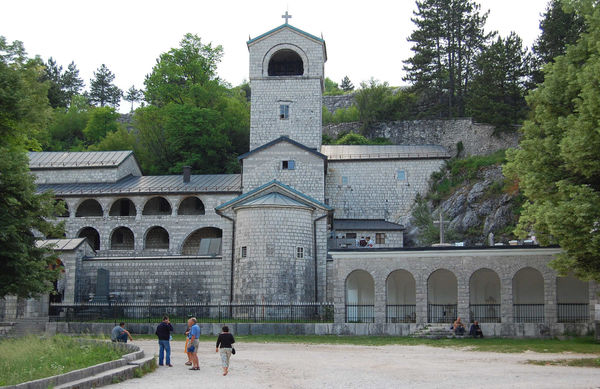Cetinje: The End of the Montenegrin Road
By Rick StevesDriving south from Croatia's Dubrovnik, I soon hit the border of Montenegro, once part of Yugoslavia and now its own nation. By European standards, Montenegro is about as poor as it gets. They don't even have their own currency. With just 600,000 people, they decided, heck, let's just use euros. And since it's such a tiny place, the official Eurozone countries are willing to look the other way.
I leave the little country's idyllic Bay of Kotor, which cuts into the mountains like a Norwegian fjord, and climb 26 switchbacks, ascending into another world. At switchback #18, I pull out for a grand view of the dramatic bay and marvel at how the vegetation, climate, and ambience are completely different just 18 switchbacks above sea level.
As my car crests the ridge, the sea disappears and before me stretches a basin defined by a ring of black mountains. It's the heartland of "Crna Gora," the local words for Montenegro (meaning "Black Mountain"). At the end of the road is Cetinje, which a road sign proclaims is the "Old Royal Capital.”
This is brutal country . Every hundred yards or so, the local towing company has spray-painted its phone number, "Auto Slep 067-838-555," on a rock. You get the feeling they are in the bushes, praying for a mishap. Desolate farmhouses claim to be selling the fruits of local labor — most commonly smoked ham, mountain cheese, and medovina (honey brandy) — but I don't see a soul. Up here, the Cyrillic alphabet survives better than on the coast.
Then comes Cetinje. Established as the capital in the 15th century, Cetinje is the historic heart of the old kingdom of Montenegro.
The town was taken by the Ottoman Empire several times. The hedonistic Turks would generally move in and enjoy a little pillage and plunder. Quickly realizing there wasn't much a hedonist could enjoy here, they just destroyed the place and moved on.
Today Cetinje is a workaday, two-story town with barely a hint of its old status. The museums are generally closed. The economy is flat. A shoe factory and a refrigerator factory were abandoned during Yugoslavia's breakup. (They were part of Tito's unworkable economic vision for Yugoslavia. In the name of efficiency, the state decided that individual products should be made in one place in huge quantities to supply the entire country.) Kids on bikes roll like tumbleweeds down the main street, past old-timers with hard memories.
At the edge of town is the Monastery of St. Peter of Cetinje — the still-beating spiritual heart of this Eastern Orthodox country. I step in. A monk with a beard halfway to his waist nods a welcome.
An old woman in black is at a candlelit basin. A service is in progress. I step in the back, and remain standing (as everyone does in Orthodox worship). The action is amazing. People — mostly teenagers in sporty track suits — are trickling in...kissing everything in sight. It's mesmerizing to see these rough and casual teens bending respectfully at the waist as they kiss icons, Bibles, and the hands of monks. Watching them on the streets, as most casual tourists do, you'd never dream that they'd be here standing through a long church service.
For the first time, I understand what the iconostasis (called a "rood screen"in Western churches) is all about. Used long ago in Catholic services, and still in use in Orthodox churches, the screen separates the common worshippers from the zone where the priests do all the religious heavy lifting.
The screen is like a holy lattice. It provides some privacy but still lets worshippers peek through. On the other side, I can see candlelight reflecting on gilded icons, incense creating an otherworldly ambience, and monks chanting hypnotically. Above it all, there are the arms of Jesus. I know he is on the cross, but I only see his arms. As the light flickers, I feel they are happy arms — wanting and eager to give everyone present a big, Slavic bear hug.


